高中英语学业水平测试复习专题四语法填空语法项目(八)情态动词和虚拟语气课件
文档属性
| 名称 | 高中英语学业水平测试复习专题四语法填空语法项目(八)情态动词和虚拟语气课件 |

|
|
| 格式 | ppt | ||
| 文件大小 | 1.5MB | ||
| 资源类型 | 试卷 | ||
| 版本资源 | 通用版 | ||
| 科目 | 英语 | ||
| 更新时间 | 2025-03-17 09:47:09 | ||
图片预览


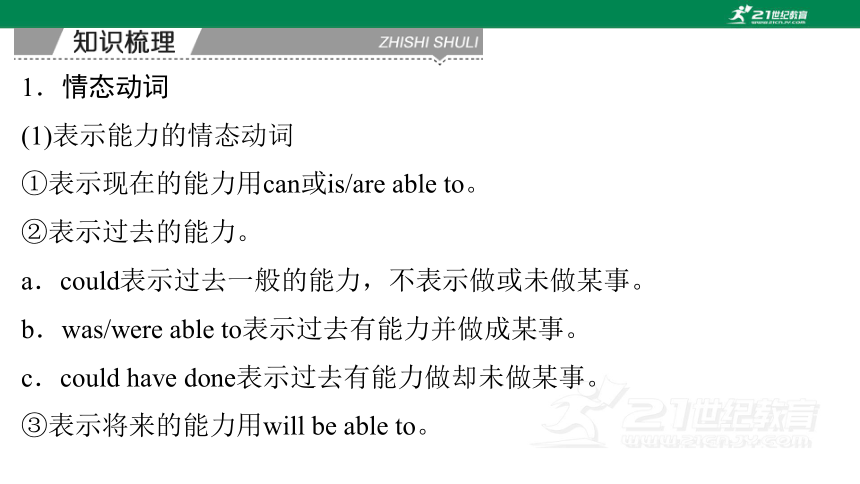
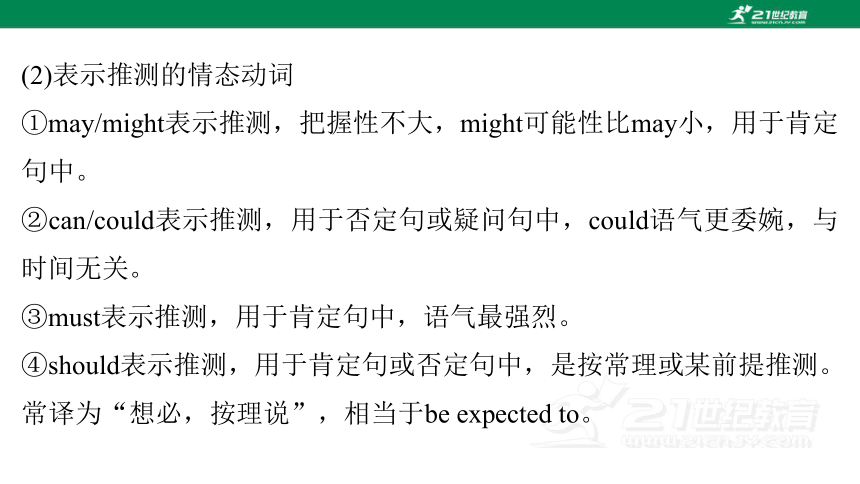
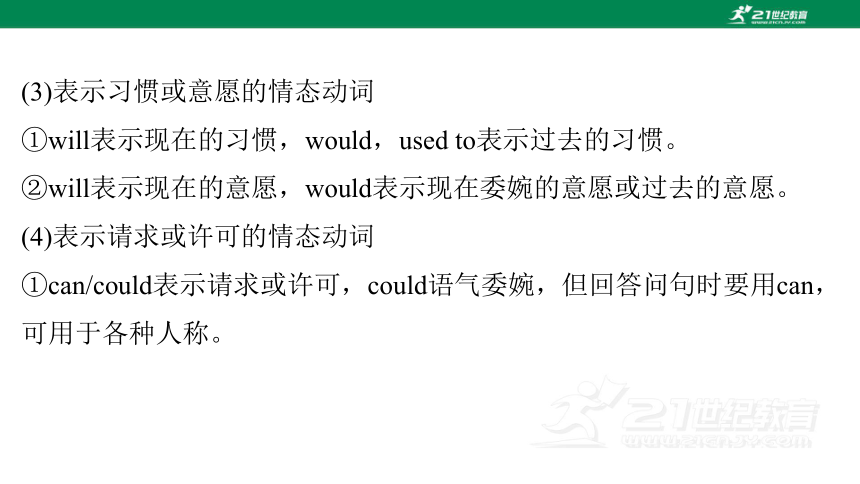
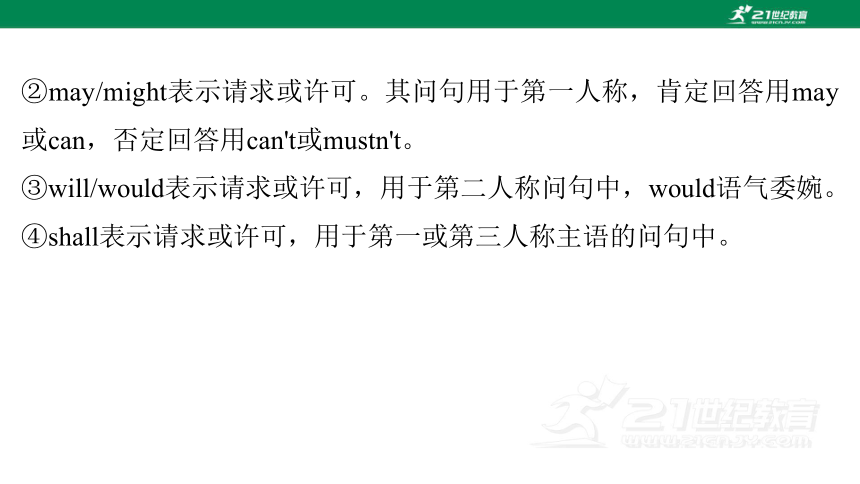
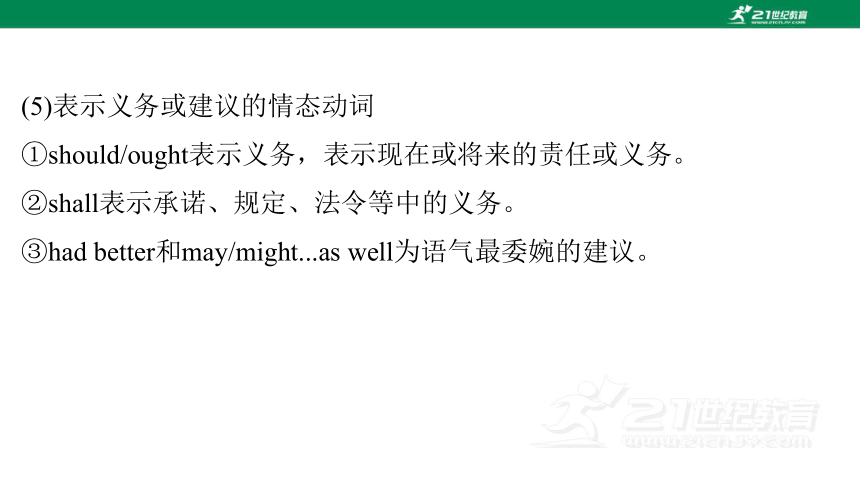
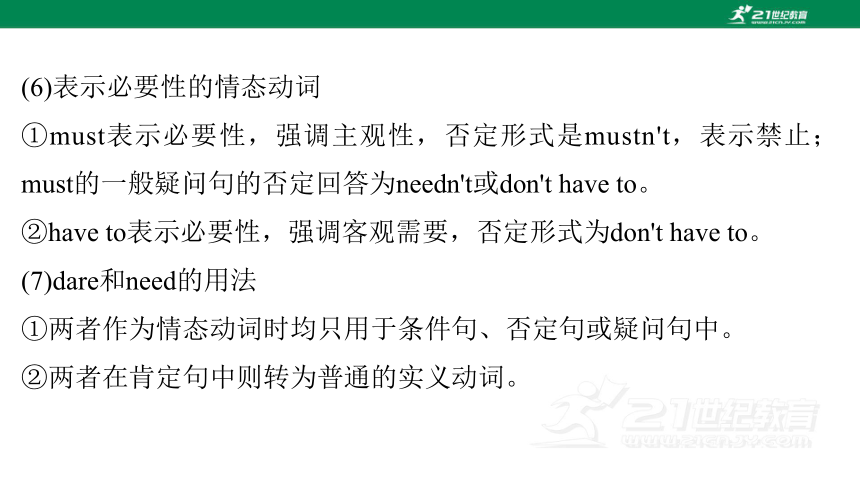
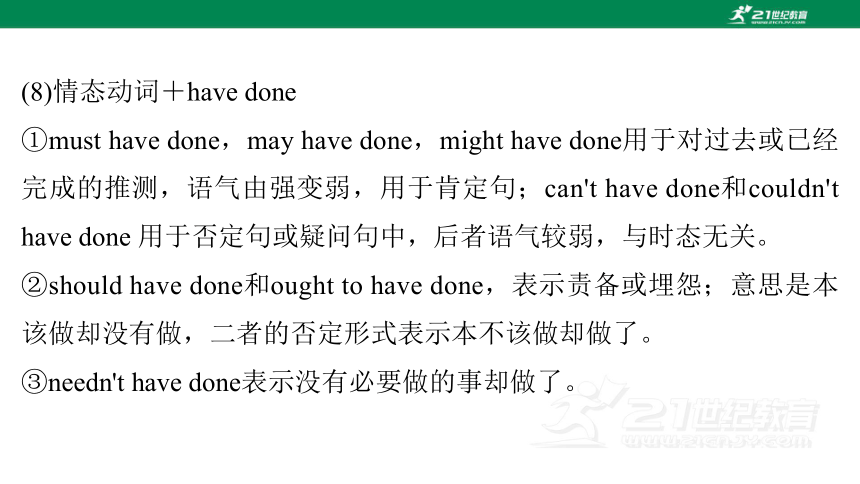
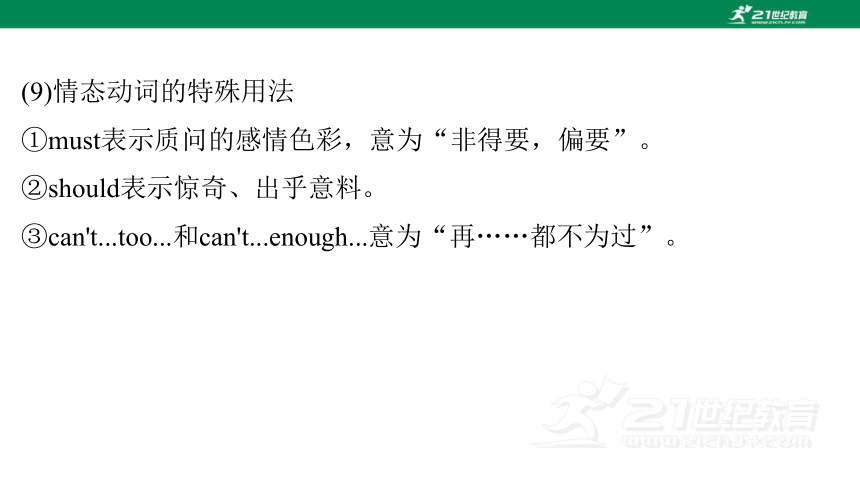
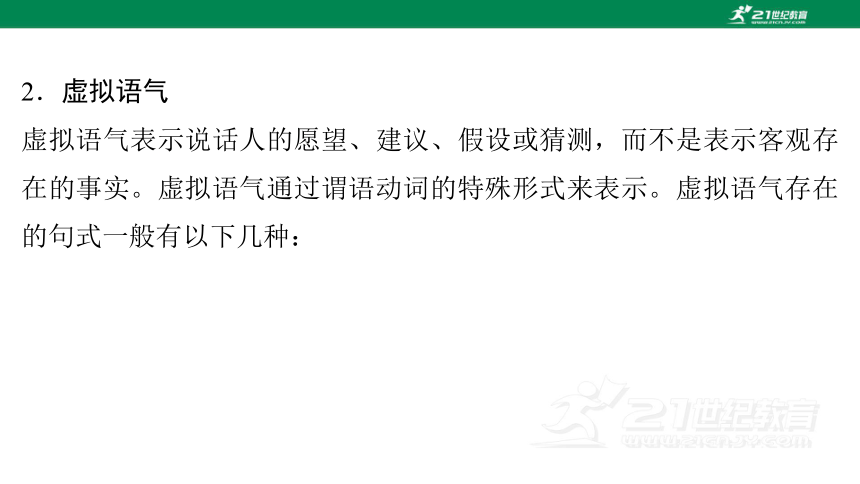
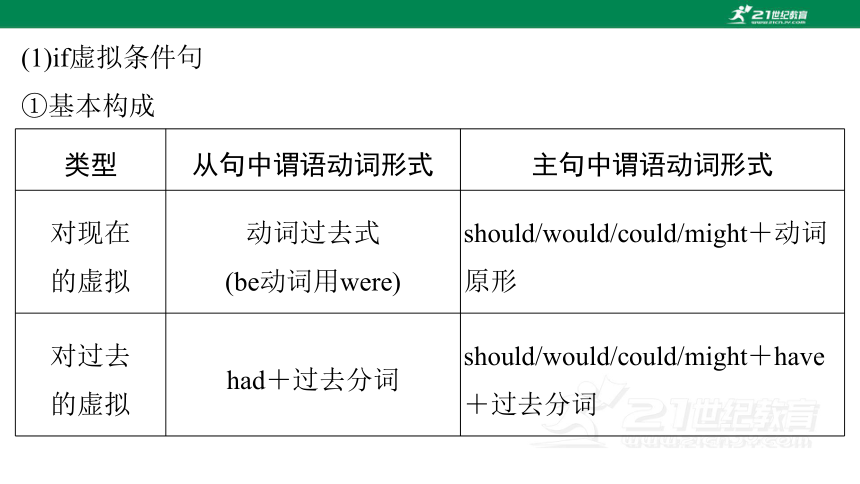
文档简介
(共36张PPT)
语法项目(八)
情态动词和虚拟语气
知识梳理
PART
01
第一部分
1.情态动词
(1)表示能力的情态动词
①表示现在的能力用can或is/are able to。
②表示过去的能力。
a.could表示过去一般的能力,不表示做或未做某事。
b.was/were able to表示过去有能力并做成某事。
c.could have done表示过去有能力做却未做某事。
③表示将来的能力用will be able to。
(2)表示推测的情态动词
①may/might表示推测,把握性不大,might可能性比may小,用于肯定句中。
②can/could表示推测,用于否定句或疑问句中,could语气更委婉,与时间无关。
③must表示推测,用于肯定句中,语气最强烈。
④should表示推测,用于肯定句或否定句中,是按常理或某前提推测。常译为“想必,按理说”,相当于be expected to。
(3)表示习惯或意愿的情态动词
①will表示现在的习惯,would,used to表示过去的习惯。
②will表示现在的意愿,would表示现在委婉的意愿或过去的意愿。
(4)表示请求或许可的情态动词
①can/could表示请求或许可,could语气委婉,但回答问句时要用can,可用于各种人称。
②may/might表示请求或许可。其问句用于第一人称,肯定回答用may或can,否定回答用can't或mustn't。
③will/would表示请求或许可,用于第二人称问句中,would语气委婉。
④shall表示请求或许可,用于第一或第三人称主语的问句中。
(5)表示义务或建议的情态动词
①should/ought表示义务,表示现在或将来的责任或义务。
②shall表示承诺、规定、法令等中的义务。
③had better和may/might...as well为语气最委婉的建议。
(6)表示必要性的情态动词
①must表示必要性,强调主观性,否定形式是mustn't,表示禁止;must的一般疑问句的否定回答为needn't或don't have to。
②have to表示必要性,强调客观需要,否定形式为don't have to。
(7)dare和need的用法
①两者作为情态动词时均只用于条件句、否定句或疑问句中。
②两者在肯定句中则转为普通的实义动词。
(8)情态动词+have done
①must have done,may have done,might have done用于对过去或已经完成的推测,语气由强变弱,用于肯定句;can't have done和couldn't have done 用于否定句或疑问句中,后者语气较弱,与时态无关。
②should have done和ought to have done,表示责备或埋怨;意思是本该做却没有做,二者的否定形式表示本不该做却做了。
③needn't have done表示没有必要做的事却做了。
(9)情态动词的特殊用法
①must表示质问的感彩,意为“非得要,偏要”。
②should表示惊奇、出乎意料。
③can't...too...和can't...enough...意为“再……都不为过”。
2.虚拟语气
虚拟语气表示说话人的愿望、建议、假设或猜测,而不是表示客观存在的事实。虚拟语气通过谓语动词的特殊形式来表示。虚拟语气存在的句式一般有以下几种:
(1)if虚拟条件句
①基本构成
类型 从句中谓语动词形式 主句中谓语动词形式
对现在
的虚拟 动词过去式
(be动词用were) should/would/could/might+动词原形
对过去
的虚拟 had+过去分词 should/would/could/might+have+过去分词
*If he had time now, he would(should/could/might) go with you.
如果他现在有时间,他会和你一起去的。(对现在的虚拟)
类型 从句中谓语动词形式 主句中谓语动词形式
对将来的虚拟 should/were to+动词原形;动词的过去式(be动词用were) should/would/could/might+动词原形
*If you had come a few minutes earlier, you would(should/could/might) have met the famous singer.
如果你早来几分钟,你就会见到那个著名歌手了。(对过去的虚拟)
*If it were to snow/should snow/snowed this evening, they would(should/could/might) not go out.
如果今天晚上下雪,他们就不会出去了。(对将来的虚拟)
②当主句和从句的行为所发生的时间不一致时,就形成混合虚拟语气,主从句的谓语动词形式要根据各自存在的时间来确定。
*If you had reviewed the lessons attentively last night, you could finish the exam easily now.
如果你昨晚专心复习了功课,你现在就可以轻松完成考试了。
*If I had got an air ticket three days earlier, I could be flying to New York now.
如果三天前我弄到了机票,我现在正飞往纽约。
③if的省略形式:
当条件状语从句中的谓语有were或有助动词时,可以省略if且把助动词或were提前。
*If there were no air, the sky would be black.
→Were there no air, the sky would be black.
如果没有空气,天空将会是黑色的。
(2)含蓄条件句
常见含蓄虚拟语气的标志词或短语有:wish(希望)、without(要是没有)、in case(万一、以防)、but for(要不是)、for fear that(唯恐)、otherwise/or(否则)、if only(要是……就好了)、as if/though(似乎、好像)、would rather(宁愿)等。
*Without/But for (=If it hadn't been for) your generous help, I couldn't have gone through that bitter period.
如果没有你慷慨相助的话,我不可能熬过那段艰苦的日子。
(3)虚拟语气在名词性从句中的用法
①表示坚持、命令、要求、建议、敦促的动词后接的宾语从句中要使用虚拟语气(should+动词原形,should可省略)。
②在“It is suggested/ordered/demanded/proposed/...that...”的主语从句中也要使用虚拟语气(should+动词原形,should可省略)。
③在“It's+necessary/essential/important/strange/natural/...+that从句”或“It's a pity/shame/...+that从句”中,that从句中也常用虚拟语气(should+动词原形,should可省略)。
④在would rather (that)后的宾语从句中,从句的谓语动词如果表示现在或将来要发生的动作,从句用一般过去时;如果表示过去发生的动作,从句用过去完成时。
⑤wish后宾语从句中的虚拟语气
a.对现在的虚拟:动词过去式(be动词用were);
b.对过去的虚拟:had+过去分词;
c.对将来的虚拟:would/could/might+动词原形。
(4)特定句式中的虚拟语气
句型结构 对过去的虚拟 对现在的虚拟 对将来的虚拟
if only引导的条件句及感叹句 had+过去分词 过去式(be动词用were) would/could/might+动词原形
as if/though引导的表语从句及方式状语从句 had+过去分词 过去式(be动词用were) would/could/might+动词原形
It is (high)time (that)... 从句中谓语动词用过去式或“should+动词原形”,should不能省略
技巧点拨
PART
02
第二部分
情态动词和虚拟语气解题“两注意”
1.若句中谓语动词为原形,在其前设纯空格题时,注意考虑情态动词。然后根据句意或句式结构填入恰当的情态动词。
2.一旦判断所给动词在句中作谓语,就要考虑其时态、语态、主谓一致等,特别要注意虚拟语气中的时态。判断虚拟语气,除了常见的if虚拟条件句,还应注意其他常搭配虚拟语气的标志词, 如suggest,would rather,as if,wish,otherwise,or,but for等。
专题训练
PART
03
第三部分
Ⅰ. 单句语法填空
1.Since you have such good preparations,there ____________ not be any problem about passing the coming job interview.
解析:句意:既然你准备得很充分,通过即将到来的工作面试应该没问题。根据since提供的原因“准备充分”可以判断出,此处表示“按理说应该发生”的,故本空填情态动词should。
should
2.We ____________(be) back in the hotel now if you didn't lose the map.
解析:句意:如果你没有丢失地图的话,我们现在就在旅馆里了。本句是虚拟语气,与现在事实相反,主句用would/could/might/should+动词原形。
3.George can't ____________(go) too far.His coffee is still warm.
解析:句意:乔治不可能走得太远。他的咖啡仍然是温的。can't have done是对过去的否定推测。
would be
have gone
4.It is lucky we booked a room,or we ____________(have) nowhere to stay now.
解析:句意:幸运的是我们预定了一个房间,否则现在我们就没有地方待了。由时间状语now可知,主句是对现在的虚拟,所以使用would have。
would have
5.You ____________ be careful with the camera.It costs!
解析:句意:你一定要小心使用这部相机。它花了不少钱呢!根据句意可知,应该用must“一定”。
6.We would rather our daughter ____________(stay) at home with us,but it is her choice, and she is not a child any longer.
解析:句意:我们宁愿让女儿和我们一起待在家里,可那是她的选择,而且她也不再是个孩子了。would rather后的宾语从句要用虚拟语气,用一般过去时表示与现在或将来相反的事实。
must
stayed
7.The only thing that I ____________ do was that I wished her a long life.
解析:句意:我唯一能做的事情是希望她能长寿。所填词表示能力,此处要表达唯一“能”做的,而且根据wished判断,句子应该用一般过去时,所以填could。
could
8.There is a good social life in the village, and I wish I ____________(have) a second chance to become more involved.
解析:句意:这个村子里的人们有良好的社交生活,我希望自己能再获得一次机会去更多地参与其中。wish后面的宾语从句往往用虚拟语气,此处表达现在的一个愿望,谓语动词要用过去式,故填had。
had
9.They might have found a better hotel if they ____________(drive) a few more kilometers.
解析:句意:如果他们再多行驶几千米,他们或许就会找到一个更好的宾馆了。根据题干中主句的谓语might have found可知本句为与过去事实相反的虚拟,因此if引导的从句中谓语动词形式应为had done,故填had driven。
had driven
10.I have her telephone number.You ____________ call her if you like.
解析:句意:我有她的电话号码,如果你不介意你可以给她打电话。所填词表示允许,此处指“你可以给她打电话”,故用can。
can
Ⅱ.语法填空
在空白处填入最合适的情态动词。
Despite the fact that you 1.________ wear school uniform every day, you 2.________ still find yourself a place at the cutting edge (领先地位) of fashion.From coloured shoelaces to special snacks (零食), this is what the cool kids in your class believe in for the summer.
have to
can
It 3.________ not be practical for you to have a new pair of shoes every day, but moving from one colour shoelaces to another 4.________ show your desire for a new look.Bright colours—red, green, light gold, pink, purple, are the top choices. There are also sports laces that come in colour combinations, such as red/white and red/black. You 5.________ even try lacing up your sports shoes in two colours!
may/might
can/will
can/may
Has changing cell phone accessories (小挂件) become part of your life Although you 6.________ not be able to afford the most advanced phone, you 7.________ still decorate it. Girls 8.________ prefer fluffy (毛茸茸的) Teddy Bears that change colour according to the temperature, while many boys like taking accessories that say things such as “The teacher is coming.”
may
can
may
Try sticking photos (大头照).They are cheap, convenient and 9.________ be carried around in your wallet. You 10.________ even choose special backgrounds of cartoon figures to show your individuality (个性).
can
can/may
语法项目(八)
情态动词和虚拟语气
知识梳理
PART
01
第一部分
1.情态动词
(1)表示能力的情态动词
①表示现在的能力用can或is/are able to。
②表示过去的能力。
a.could表示过去一般的能力,不表示做或未做某事。
b.was/were able to表示过去有能力并做成某事。
c.could have done表示过去有能力做却未做某事。
③表示将来的能力用will be able to。
(2)表示推测的情态动词
①may/might表示推测,把握性不大,might可能性比may小,用于肯定句中。
②can/could表示推测,用于否定句或疑问句中,could语气更委婉,与时间无关。
③must表示推测,用于肯定句中,语气最强烈。
④should表示推测,用于肯定句或否定句中,是按常理或某前提推测。常译为“想必,按理说”,相当于be expected to。
(3)表示习惯或意愿的情态动词
①will表示现在的习惯,would,used to表示过去的习惯。
②will表示现在的意愿,would表示现在委婉的意愿或过去的意愿。
(4)表示请求或许可的情态动词
①can/could表示请求或许可,could语气委婉,但回答问句时要用can,可用于各种人称。
②may/might表示请求或许可。其问句用于第一人称,肯定回答用may或can,否定回答用can't或mustn't。
③will/would表示请求或许可,用于第二人称问句中,would语气委婉。
④shall表示请求或许可,用于第一或第三人称主语的问句中。
(5)表示义务或建议的情态动词
①should/ought表示义务,表示现在或将来的责任或义务。
②shall表示承诺、规定、法令等中的义务。
③had better和may/might...as well为语气最委婉的建议。
(6)表示必要性的情态动词
①must表示必要性,强调主观性,否定形式是mustn't,表示禁止;must的一般疑问句的否定回答为needn't或don't have to。
②have to表示必要性,强调客观需要,否定形式为don't have to。
(7)dare和need的用法
①两者作为情态动词时均只用于条件句、否定句或疑问句中。
②两者在肯定句中则转为普通的实义动词。
(8)情态动词+have done
①must have done,may have done,might have done用于对过去或已经完成的推测,语气由强变弱,用于肯定句;can't have done和couldn't have done 用于否定句或疑问句中,后者语气较弱,与时态无关。
②should have done和ought to have done,表示责备或埋怨;意思是本该做却没有做,二者的否定形式表示本不该做却做了。
③needn't have done表示没有必要做的事却做了。
(9)情态动词的特殊用法
①must表示质问的感彩,意为“非得要,偏要”。
②should表示惊奇、出乎意料。
③can't...too...和can't...enough...意为“再……都不为过”。
2.虚拟语气
虚拟语气表示说话人的愿望、建议、假设或猜测,而不是表示客观存在的事实。虚拟语气通过谓语动词的特殊形式来表示。虚拟语气存在的句式一般有以下几种:
(1)if虚拟条件句
①基本构成
类型 从句中谓语动词形式 主句中谓语动词形式
对现在
的虚拟 动词过去式
(be动词用were) should/would/could/might+动词原形
对过去
的虚拟 had+过去分词 should/would/could/might+have+过去分词
*If he had time now, he would(should/could/might) go with you.
如果他现在有时间,他会和你一起去的。(对现在的虚拟)
类型 从句中谓语动词形式 主句中谓语动词形式
对将来的虚拟 should/were to+动词原形;动词的过去式(be动词用were) should/would/could/might+动词原形
*If you had come a few minutes earlier, you would(should/could/might) have met the famous singer.
如果你早来几分钟,你就会见到那个著名歌手了。(对过去的虚拟)
*If it were to snow/should snow/snowed this evening, they would(should/could/might) not go out.
如果今天晚上下雪,他们就不会出去了。(对将来的虚拟)
②当主句和从句的行为所发生的时间不一致时,就形成混合虚拟语气,主从句的谓语动词形式要根据各自存在的时间来确定。
*If you had reviewed the lessons attentively last night, you could finish the exam easily now.
如果你昨晚专心复习了功课,你现在就可以轻松完成考试了。
*If I had got an air ticket three days earlier, I could be flying to New York now.
如果三天前我弄到了机票,我现在正飞往纽约。
③if的省略形式:
当条件状语从句中的谓语有were或有助动词时,可以省略if且把助动词或were提前。
*If there were no air, the sky would be black.
→Were there no air, the sky would be black.
如果没有空气,天空将会是黑色的。
(2)含蓄条件句
常见含蓄虚拟语气的标志词或短语有:wish(希望)、without(要是没有)、in case(万一、以防)、but for(要不是)、for fear that(唯恐)、otherwise/or(否则)、if only(要是……就好了)、as if/though(似乎、好像)、would rather(宁愿)等。
*Without/But for (=If it hadn't been for) your generous help, I couldn't have gone through that bitter period.
如果没有你慷慨相助的话,我不可能熬过那段艰苦的日子。
(3)虚拟语气在名词性从句中的用法
①表示坚持、命令、要求、建议、敦促的动词后接的宾语从句中要使用虚拟语气(should+动词原形,should可省略)。
②在“It is suggested/ordered/demanded/proposed/...that...”的主语从句中也要使用虚拟语气(should+动词原形,should可省略)。
③在“It's+necessary/essential/important/strange/natural/...+that从句”或“It's a pity/shame/...+that从句”中,that从句中也常用虚拟语气(should+动词原形,should可省略)。
④在would rather (that)后的宾语从句中,从句的谓语动词如果表示现在或将来要发生的动作,从句用一般过去时;如果表示过去发生的动作,从句用过去完成时。
⑤wish后宾语从句中的虚拟语气
a.对现在的虚拟:动词过去式(be动词用were);
b.对过去的虚拟:had+过去分词;
c.对将来的虚拟:would/could/might+动词原形。
(4)特定句式中的虚拟语气
句型结构 对过去的虚拟 对现在的虚拟 对将来的虚拟
if only引导的条件句及感叹句 had+过去分词 过去式(be动词用were) would/could/might+动词原形
as if/though引导的表语从句及方式状语从句 had+过去分词 过去式(be动词用were) would/could/might+动词原形
It is (high)time (that)... 从句中谓语动词用过去式或“should+动词原形”,should不能省略
技巧点拨
PART
02
第二部分
情态动词和虚拟语气解题“两注意”
1.若句中谓语动词为原形,在其前设纯空格题时,注意考虑情态动词。然后根据句意或句式结构填入恰当的情态动词。
2.一旦判断所给动词在句中作谓语,就要考虑其时态、语态、主谓一致等,特别要注意虚拟语气中的时态。判断虚拟语气,除了常见的if虚拟条件句,还应注意其他常搭配虚拟语气的标志词, 如suggest,would rather,as if,wish,otherwise,or,but for等。
专题训练
PART
03
第三部分
Ⅰ. 单句语法填空
1.Since you have such good preparations,there ____________ not be any problem about passing the coming job interview.
解析:句意:既然你准备得很充分,通过即将到来的工作面试应该没问题。根据since提供的原因“准备充分”可以判断出,此处表示“按理说应该发生”的,故本空填情态动词should。
should
2.We ____________(be) back in the hotel now if you didn't lose the map.
解析:句意:如果你没有丢失地图的话,我们现在就在旅馆里了。本句是虚拟语气,与现在事实相反,主句用would/could/might/should+动词原形。
3.George can't ____________(go) too far.His coffee is still warm.
解析:句意:乔治不可能走得太远。他的咖啡仍然是温的。can't have done是对过去的否定推测。
would be
have gone
4.It is lucky we booked a room,or we ____________(have) nowhere to stay now.
解析:句意:幸运的是我们预定了一个房间,否则现在我们就没有地方待了。由时间状语now可知,主句是对现在的虚拟,所以使用would have。
would have
5.You ____________ be careful with the camera.It costs!
解析:句意:你一定要小心使用这部相机。它花了不少钱呢!根据句意可知,应该用must“一定”。
6.We would rather our daughter ____________(stay) at home with us,but it is her choice, and she is not a child any longer.
解析:句意:我们宁愿让女儿和我们一起待在家里,可那是她的选择,而且她也不再是个孩子了。would rather后的宾语从句要用虚拟语气,用一般过去时表示与现在或将来相反的事实。
must
stayed
7.The only thing that I ____________ do was that I wished her a long life.
解析:句意:我唯一能做的事情是希望她能长寿。所填词表示能力,此处要表达唯一“能”做的,而且根据wished判断,句子应该用一般过去时,所以填could。
could
8.There is a good social life in the village, and I wish I ____________(have) a second chance to become more involved.
解析:句意:这个村子里的人们有良好的社交生活,我希望自己能再获得一次机会去更多地参与其中。wish后面的宾语从句往往用虚拟语气,此处表达现在的一个愿望,谓语动词要用过去式,故填had。
had
9.They might have found a better hotel if they ____________(drive) a few more kilometers.
解析:句意:如果他们再多行驶几千米,他们或许就会找到一个更好的宾馆了。根据题干中主句的谓语might have found可知本句为与过去事实相反的虚拟,因此if引导的从句中谓语动词形式应为had done,故填had driven。
had driven
10.I have her telephone number.You ____________ call her if you like.
解析:句意:我有她的电话号码,如果你不介意你可以给她打电话。所填词表示允许,此处指“你可以给她打电话”,故用can。
can
Ⅱ.语法填空
在空白处填入最合适的情态动词。
Despite the fact that you 1.________ wear school uniform every day, you 2.________ still find yourself a place at the cutting edge (领先地位) of fashion.From coloured shoelaces to special snacks (零食), this is what the cool kids in your class believe in for the summer.
have to
can
It 3.________ not be practical for you to have a new pair of shoes every day, but moving from one colour shoelaces to another 4.________ show your desire for a new look.Bright colours—red, green, light gold, pink, purple, are the top choices. There are also sports laces that come in colour combinations, such as red/white and red/black. You 5.________ even try lacing up your sports shoes in two colours!
may/might
can/will
can/may
Has changing cell phone accessories (小挂件) become part of your life Although you 6.________ not be able to afford the most advanced phone, you 7.________ still decorate it. Girls 8.________ prefer fluffy (毛茸茸的) Teddy Bears that change colour according to the temperature, while many boys like taking accessories that say things such as “The teacher is coming.”
may
can
may
Try sticking photos (大头照).They are cheap, convenient and 9.________ be carried around in your wallet. You 10.________ even choose special backgrounds of cartoon figures to show your individuality (个性).
can
can/may
同课章节目录
